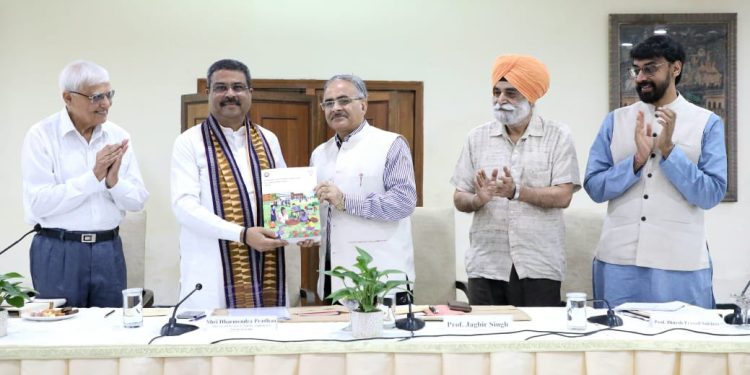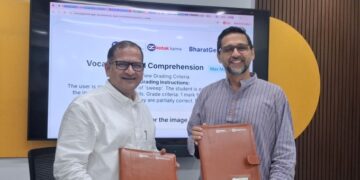Union Minister for Education and Skill Development & Entrepreneurship, Dharmendra Pradhan released the much-anticipated National Curriculum Framework for School Education (NCF-SE) in New Delhi on Aug 23. This 600-page framework addresses the entire educational journey from foundational to secondary stages.
The new National Curriculum Framework for School Education (NCF-SE) is the curriculum framework for the 5+3+3+4 design of schooling as proposed by the National Education Policy 2020 (NEP 2020). The entire curriculum framework for all the four stages – Foundational Stage, Preparatory Stage, Middle Stage, and Secondary Stage – was released.
“This is the first ever integrated Curriculum Framework for children between ages 3-18 in India. It is a direct outcome of the 5+3+3+4 ‘curricular and pedagogical’ structure that NEP 2020 has come out with for School Education. To ensure appropriate focus and fillip to the Foundational Stage (ages 3-8), the detailed National Curriculum Framework for Foundational Stage (NCF-FS) was released on 20 October 2022 by the Hon’ble Minister of Education, which is integrated within the NCF-SE. The National Curriculum Frameworks for Teacher Education, and for Adult Education, will follow shortly,” wrote K. Kasturirangan Chairperson National Steering Committee for National Curriculum Frameworks in the NCFSE foreword.
The framework introduces multidisciplinary education, nurturing values, fostering creative pedagogies, and preparing students for practical problem-solving. Art Education, Physical Education & Well-being, Environmental Education, and Vocational Education are reinvigorated under the NCF-SE. Multilingualism, conceptual understanding in Mathematics, and capacities for scientific inquiry also receive renewed attention. The curriculum’s interdisciplinary approach encourages students to study the relationships between individuals, society, and the environment.
Speaking on the occasion union Education Minister said that it is a momentous boost to implementation of NEP. Efforts are on to make new textbooks available from next academic year. “The textbooks for class 3-12 to be aligned with 21st Century requirements, making them rooted and futuristic,” he added.
The NCF-SE is organised into the following five parts:
- Part A articulates the broad aims of school education, and the desirable values and dispositions, capacities and skills, and knowledge that are required for achieving these aims. It also lays down the principles and approaches for content selection, pedagogy, and assessment and gives the rationale and design principles for the four stages of schooling.
- Part B focuses on some of the important cross-cutting themes of NCF-SE, viz., rootedness in India, education for values, learning and caring about the environment, inclusive education, guidance and counselling, and use of educational technology.
- Part C has separate chapters for each school subject. Each of these chapters have Learning Standards defined for all the relevant stages of schooling along with specific guidelines for content selection, pedagogy, and assessments appropriate for that subject. The part also has a chapter on the Foundational Stage and one on design and range of subjects in Grades 11 and 12.
- Part D handles school culture and processes that enable a positive learning environment and inculcate desirable values and dispositions.
- The last part, Part E, outlines the requirements for an overall ecosystem of schooling that would enable the achievement of the aims of the NCF-SE. This includes aspects of teacher capacities and service conditions, physical infrastructure requirements, and the role of the community and family.
NCF-SE Highlights:
- Comprehensive curriculum framework covering all 4 stages of schooling. The NCF-SE comprehensively covers all the four stages of schooling. The NCF-SE has articulated the learning standards to be achieved and the principles for selection of content, pedagogy, and assessments for achieving the learning standards.
- Enable real improvement in practise of education in the country. The NCF-SE is designed to enable and help actual change in practise on the ground. The NCF-SE has made conscious and deliberate effort to communicate to all stakeholders in school education including Curriculum and Syllabus developers, so that it is useable in practical circumstances. Teachers and parent community can also comprehend the intention of the curricula that is developed on the basis of the NCF-SE.
- Learning Standards with clear, specific, and rigorous flow-down. It articulates specific learning standards for all school subjects that gives clear direction for action for all stakeholders in the school system, particularly Teachers. The Learning Standards have defined specific competencies to be achieved at the end of each stage for each school subject. There is a clear, specific, and rigorous flow-down of curricular logic from the broad aims of school education to specific curricular aims of each subject, resulting in curricular goals and competencies for a specific stage in that subject.
- Development of Knowledge, Capacities, and Values. The curriculum focuses on development of knowledge with genuine understanding, fundamental capacities such as critical thinking and creativity, and constitutional and human values.
- Empowering teachers and schools. The NCF-SE designed to enable and empower teachers and schools for the full flowering of their creativity and enhanced engagement.
- Engaging and effective pedagogy. It enables the entire range of age and context appropriate pedagogy, from play-based, activity-based, inquiry-based, dialogue based, and more. This would also use effective, widely available, and highly engaging teaching-learning-material, including textbooks.
- Transforming assessment including exams. Assessment and exams at all levels to be transformed, to enable genuine learning and reduce stress, including the Board exams.
- Importance of School Culture. School culture and practises are to be developed as an integral and important part of the curriculum.
- Rooted in India. The curriculum is rooted in India and is informed by the wealth of Indian knowledge and thought on education. Contributions to the knowledge in various disciplines by Indians from the ancient to contemporary times have been integrated into the curricular goals of all school subjects.
- Multidisciplinary education. All children to go through multidisciplinary education to develop an integrated and holistic perspective and learning.
- Equity and inclusion. The NCF-SE is informed by principles to ensure equity and inclusion in all its aspects, from content and pedagogy, to, school culture and practises.
- Renewed emphasis on Art, and, Physical Education & Well-being. The school subjects of Art Education and Physical Education & Well-being are given a renewed emphasis in the curriculum by defining specific learning standards to be achieved and recommended time allocation in the school timetables. Art Education encompasses both visual arts and performing arts and has equal emphasis on making, thinking about, and appreciating artwork. Physical Education and Well-being gives emphasis to sports, mind-body wellness through practices like Yoga, and ideas on incorporating traditional Indian games and sports into the curriculum.
- Environmental Education. Responding to the triple challenge of climate change, biodiversity loss, and pollution, and the criticality of environmental awareness and sustainability in today’s world, Environmental Education is given due emphasis across all stages of schooling culminating in a separate area of study in the Secondary Stage.
- Vocational Education. The NEP 2020 has made strong recommendations for Vocational Education to be an integral part of school education and the NCF-SE has included specific learning standards, content, pedagogy, and assessments for Vocational Education for all stages of schooling. The curriculum proposes engagement in the three different forms of work – work with life forms (agriculture, animal husbandry), work with materials and machines, and work in human services.
- Multilingualism and Indian Languages. The NCF-SE has given the necessary emphasis on multilingualism and on learning languages native to India. Given the rich multilingual heritage of India, it expects all students to be proficient in at least three languages, at least two of which are native to India. It expects students to achieve a “literary level” of linguistic capacity in at least one of these Indian languages.
- Conceptual understanding and procedural fluency in Mathematics. The school subject of Mathematics & Computational Thinking has emphasis on conceptual understanding along with procedural fluency – with a goal to appreciate the beauty and universality of mathematics and reduce fear of the subject. Higher order curricular goals such as problem solving, mathematical thinking, coding, and communication are given due importance.
- Capacities for Scientific Inquiry. Science Education emphasises the development of capacities for scientific inquiry along with acquiring knowledge of fundamental theories, laws, and conceptual structures of science in disciplines such as Biology, Chemistry, Physics, and Earth Science.
- Interdisciplinary understanding of Social Science through themes. The social science curriculum expects students to systematically study human societies and explore the relationships between individuals, society, the natural environment, social institutions, and organizations. This is to be studied through themes in an interdisciplinary manner in the Middle Stage and developing disciplinary depth in the Secondary Stage.
- Flexibility and Choice in Secondary Stage. The Secondary Stage has been significantly redesigned to offer more flexibility and choice for students. There are no hard separations between academic and vocational subjects, or between science, social science, art, and physical education. Students can choose interesting combinations of subjects for receiving their school-leaving certificates.
- Interdisciplinary Areas of Study.Interdisciplinary Areas of Study has been introduced as a separate subject of study in the Secondary Stage. In this subject, students develop the ability to reason about contemporary challenges using knowledge from multiple disciplines including moral and ethical concerns. They are expected to use these abilities to understand and respond effectively to the concerns of environmental degradation that include climate change and biodiversity loss.













